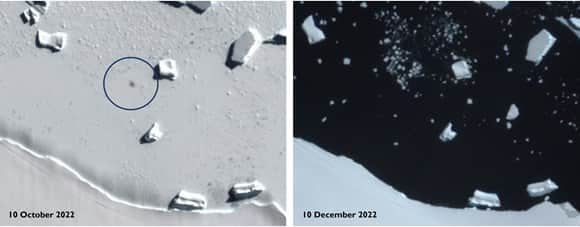Emperor penguins: 'catastrophic breeding failure' for beloved Antarctic species as sea ice disappears
and live on Freeview channel 276
No chicks are believed to have survived from four-out-of-five emperor penguin colonies in one Antarctic region last breeding season, with scientists saying there is little time left to act if we want to stop "ecosystem annihilation".
A new study from the British Antarctic Survey published on Thursday (24 August) found breeding sites around the central and eastern Bellingshausen Sea suffered a 100% loss of vital sea ice, well before the young chicks would have grown the waterproof feathers they need to survive.
Advertisement
Hide AdAdvertisement
Hide AdResearchers say their latest discovery supports predictions that more than 90% of emperor penguin colonies will be quasi-extinct - or doomed to extinction even if some individuals are still alive - by the end of this century, based on current global warming trends.
The study's lead author, Dr Peter Fretwell, said the survey has "never seen emperor penguins fail to breed, at this scale, in a single season".


The scientists examined satellite images that showed the loss of sea ice at breeding sites, and said there was a "high probability" that no chicks had survived from four of the five known colonies.
Emperor penguins are dependent on 'land-fast' sea ice - or ice that is firmly attached to the shore - for most of the year, from April through to January. Once they arrive at their chosen breeding site, penguins lay eggs in Antarctic winter from May to June. They hatch after 65 days, but chicks do not fledge until summer, between December and January.
Advertisement
Hide AdAdvertisement
Hide Ad"The loss of sea ice in this region during the Antarctic summer made it very unlikely that displaced chicks would survive," Dr Fretwell continued.
"We know that emperor penguins are highly vulnerable in a warming climate - and current scientific evidence suggests that extreme sea ice loss events like this will become more frequent and widespread."
By the beginning of December 2022, the amount of Antarctic sea ice left had matched the previous all-time low, set in 2021. The most extreme loss was seen in the central and eastern Bellingshausen Sea region, west of the Antarctic Peninsula, with a 100% loss of sea ice by November 2022, the satellite images showed.
Since 2016, Antarctica has experienced its the four lowest areas of sea ice years since satellite records began, 45 years ago. The two lowest years were 2021/22 and 2022/23. Between 2018 and 2022, 30% of the 62 known emperor penguin colonies across Antarctica were affected by partial or total sea ice loss.
Advertisement
Hide AdAdvertisement
Hide Ad

Although it was difficult to immediately link specific extreme seasons to climate change, researchers said a longer-term decline in sea ice extent was expected with current climate models.
The British Antarctic Survey said emperor penguins have previously responded to sea ice loss by moving to more stable sites the following year. However, scientists say that this strategy won’t work if sea ice habitats across an entire region is affected.
Emperor penguin populations have never been subject to large scale hunting, habitat loss, overfishing or other human interactions in the modern era - and, unusually, climate change was considered the only major factor influencing their long-term population change.
Recent efforts to predict emperor penguin population trends from sea ice loss forecasts have painted a bleak picture, scientists said, showing that if present rates of warming persist, over 90% of colonies will be quasi-extinct by 2100.
Advertisement
Hide AdAdvertisement
Hide AdPolar climate scientist for the survey, Dr Caroline Holmes, said as of 20 August, the area of ice covering Antarctica's seas was 2.2 million square-kilometres lower than the 1981 to 2022 average, with the missing chunk larger than Greenland - around ten times the size of the United Kingdom.
“Right now, in August 2023, the sea ice extent in Antarctica is still far below all previous records for this time of year. In this period where oceans are freezing up, we’re seeing areas that are still, remarkably, largely ice-free," she said.
While they would need years of targeted observations to know just how much the current conditions were being influenced by manmade climate change and by natural ocean variability, she said, "the recent years of tumbling sea ice records and warming of the subsurface Southern Ocean point strongly to human-induced global warming exacerbating these extremes".
Sea ice physicist Dr Jeremy Wilkinson added that this paper "dramatically reveals the connection between sea ice loss and ecosystem annihilation".
Advertisement
Hide AdAdvertisement
Hide Ad"Climate change is melting sea ice at an alarming rate. It is likely to be absent from the Arctic in the 2030s - and in the Antarctic, the four lowest sea ice extents recorded have been since 2016," he continued.
"It is another warning sign for humanity that we cannot continue down this path, politicians must act to minimise the impact of climate change. There is no time left.”
Comment Guidelines
National World encourages reader discussion on our stories. User feedback, insights and back-and-forth exchanges add a rich layer of context to reporting. Please review our Community Guidelines before commenting.
